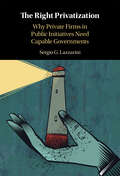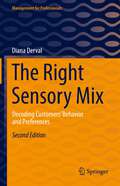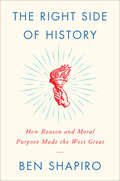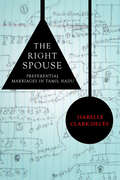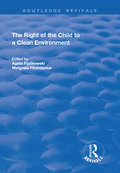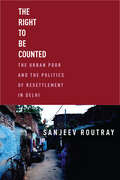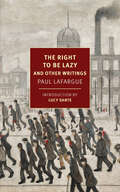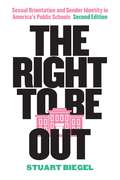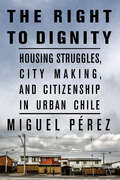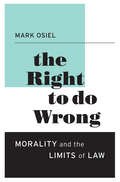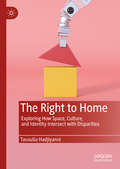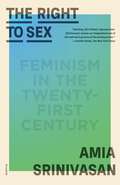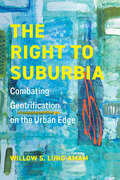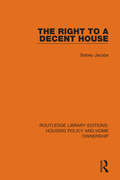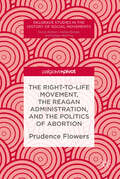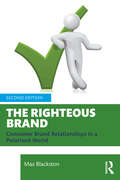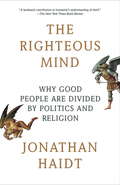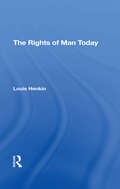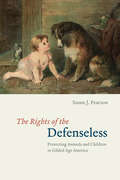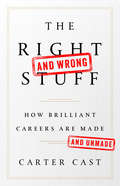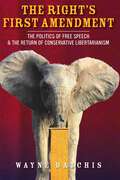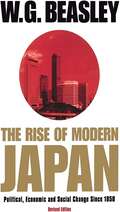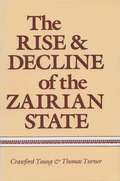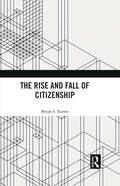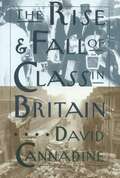- Table View
- List View
The Right Privatization: Why Private Firms in Public Initiatives Need Capable Governments
by Sergio G. LazzariniThe public debate is rife with polarized views of how to deliver essential services such as education, health, and security. While some tout privatization as a way to supplant bad governments, others warn that private firms maximize profits at the expense of socially oriented service attributes. In reality, all forms of service delivery—public, private and hybrid public private-collaborations—have merits and flaws. This book scrutinizes the menu of delivery forms in public services and the conditions that should make them work. It argues that privatization benefits from capable government units committing to well-defined policy objectives, mobilizing critical resources, and incentivizing effective and inclusive delivery. Societies counting on capable governments can also reject single solutions and experiment with plural paths of improvement, where public and private organizations co-exist and learn from each other. This book will appeal to students, academics, managers and policy makers interested in examining the public-private boundary and the many ramifications of this focal issue.
The Right Sensory Mix: Decoding Customers’ Behavior and Preferences (Management for Professionals)
by Diana DervalMany companies fail to acknowledge and analyze disparities observed among customers and simply put them down to culture or emotion. New neuroendocrinological research proves that people are rational: They just have a different biological perception of the same stimulus. Their preferences, behavior, and decisions are strongly influenced by the hundreds of millions of sensors monitoring their body and brain. People with more taste buds are, for example, sensitive to bitterness and are more likely to drink their coffee with sugar or milk, or to drink tea. This book helps product managers, marketers, and corporate decision-makers understand and predict customers’ behavior and preferences. It provides the tools to design the right sensory mix (color, shape, depth, taste, smell, texture, and sound) for each product, and fine-tune their positioning and range for every local market. Using cases from different sectors, the author shows that this approach delivers planet and people-friendly innovations which have a higher chance of success in the market.
The Right Side of History: How Reason and Moral Purpose Made the West Great
by Ben ShapiroAmerica has a God-shaped hole in its heart, argues New York Times bestselling author Ben Shapiro, and we shouldn't fill it with politics and hate. <P><P>In 2016, Ben Shapiro spoke at UC Berkeley. Hundreds of police officers were required from 10 UC campuses across the state to protect his speech, which was -- ironically -- about the necessity for free speech and rational debate. He came to argue that Western Civilization is in the midst of a crisis of purpose and ideas. Our freedoms are built upon the twin notions that every human being is made in God’s image and that human beings were created with reason capable of exploring God’s world. We can thank these values for the birth of science, the dream of progress, human rights, prosperity, peace, and artistic beauty. <P><P>Jerusalem and Athens built America, ended slavery, defeated the Nazis and the Communists, lifted billions from poverty and gave billions spiritual purpose. Jerusalem and Athens were the foundations of the Magna Carta and the Treaty of Westphalia; they were the foundations of Declaration of Independence, Abraham Lincoln’s Emancipation Proclamation, and Martin Luther King Jr.’s Letter from Birmingham Jail.Civilizations that rejected Jerusalem and Athens have collapsed into dust. <P><P>The USSR rejected Judeo-Christian values and Greek natural law, substituting a new utopian vision of “social justice” – and they starved and slaughtered tens of millions of human beings. The Nazis rejected Judeo-Christian values and Greek natural law, and they shoved children into gas chambers. Venezuela rejects Judeo-Christian values and Greek natural law, and citizens of their oil-rich nation have been reduced to eating dogs. We are in the process of abandoning Judeo-Christian values and Greek natural law, favoring instead moral subjectivism and the rule of passion. And we are watching our civilization collapse into age-old tribalism, individualistic hedonism, and moral subjectivism. We believe we can reject Judeo-Christian values and Greek natural law and satisfy ourselves with intersectionality, or scientific materialism, or progressive politics, or authoritarian governance, or nationalistic solidarity. We can’t. <P><P>The West is special, and in The Right Side of History, Ben Shapiro bravely explains that it’s because too many of us have lost sight of the moral purpose that drives us each to be better, or the sacred duty to work together for the greater good, or both. A stark warning, and a call to spiritual arms, this book may be the first step in getting our civilization back on track. <P><b>A New York Times Bestseller</b>
The Right Spouse: Preferential Marriages in Tamil Nadu
by Isabelle Clark-DecèsThe Right Spouse is an engaging investigation into Tamil (South Indian) preferential close kin marriages, so-called Dravidian Kinship. This book offers a description and an interpretation of preferential marriages with close kin in South India, as they used to be arranged and experienced in the recent past and as they are increasingly discontinued in the present. Clark-Decès presents readers with a focused anthropology of this waning marriage system: its past, present, and dwindling future. The book takes on the main pillars of Tamil social organization, considers the ways in which Tamil intermarriage establishes kinship and social rank, and argues that past scholars have improperly defined "Dravidian" kinship. Within her critique of past scholarship, Clark-Decès recasts a powerful and vivid image of preferential marriage in Tamil Nadu and how those preferences and marital rules play out in lived reality. What Clark-Decès discovers in her fieldwork are endogamous patterns and familial connections that sometimes result in flawed relationships, contradictory statuses, and confused roles. The book includes a fascinating narration of the complex terrain that Tamil youth currently navigate as they experience the complexities and changing nature of marriage practices and seek to reconcile their established kinship networks to more individually driven marriages and careers.
The Right of the Child to a Clean Environment
by AGATA FIJALKOWSKI AND MALGOSIA FITZMAURICEThis title was first published in 2000: A discussion on the right of a child to a clean environment. It links two important contemporary issues: human rights and the environment. The volume consists of the extended versions of some of the papers which were presented at a workshop on "The Right of a Child to a Clean Environment", held at Queen Mary and Westfield College, University of London, in 1997, and there are also some additional contributions. The workshop participants included Michael Anderson and Sylvia Bluck, Harry Post, Holly Cullen and Olufemi Elias. The additional contributors include Veronic Wright, Maria G. Doglioli and Soledad Aguilar. There are essays on general issues, selected case studies and annexes.
The Right to Be Counted: The Urban Poor and the Politics of Resettlement in Delhi (South Asia in Motion)
by Sanjeev RoutrayIn the last 30 years, Delhi, the capital of India, has displaced over 1.5 million poor people. Resettlement and welfare services are available—but exclusively so, as the city deems much of the population ineligible for civic benefits. The Right to Be Counted examines how Delhi's urban poor, in an effort to gain visibility from the local state, incrementally stake their claims to a house and life in the city. Contributing to debates about the contradictions of state governmentality and the citizenship projects of the poor in Delhi, this book explores social suffering, logistics, and the logic of political mobilizations that emanate from processes of displacement and resettlement. Sanjeev Routray draws upon fieldwork conducted in various low-income neighborhoods throughout the 2010s to describe the process of claims-making as an attempt by the political community of the poor to assert its existence and numerical strength, and demonstrates how this struggle to be counted constitutes the systematic, protracted, and incremental political process by which the poor claim their substantive entitlements and become entrenched in the city. Analyzing various social, political, and economic relationships, as well as kinship networks and solidarity linkages across the political and social spectrum, this book traces the ways the poor work to gain a foothold in Delhi and establish agency for themselves.
The Right to Be Lazy: And Other Writings
by Paul LafargueNow in a new translation, a classic nineteenth-century defense for the cause of idleness by a revolutionary writer and activist (and Karl Marx's son-in law) that reshaped European ideas of labor and production.Exuberant, provocative, and as controversial as when it first appeared in 1880, Paul Lafargue&’s The Right to Be Lazy is a call for the workers of the world to unite—and stop working so much! Lafargue, Karl Marx&’s son-in-law (about whom Marx once said, &“If he is a Marxist, then I am clearly not&”) wrote his pamphlet on the virtues of laziness while in prison for giving a socialist speech. At once a timely argument for a three-hour workday and a classical defense of leisure, The Right to Be Lazy shifted the course of European thought, going through seventeen editions in Russia during the Revolution of 1905 and helping shape John Maynard Keynes&’s ideas about overproduction. Published here with a selection of Lafargue&’s other writings—including an essay on Victor Hugo and a memoir of Marx—The Right to Be Lazy reminds us that the urge to work is not always beneficial, let alone necessary. It can also be a &“strange madness&” consuming human lives.
The Right to Be Out: Sexual Orientation and Gender Identity in America's Public Schools, Second Edition
by Stuart BiegelAn updated edition of this measured, practical, and timely guide to LGBT rights and issues for educators and school officials With ongoing battles over transgender rights, bullying cases in the news almost daily, and marriage equality only recently the law of the land, the information in The Right to Be Out could not be more timely or welcome. In an updated second edition that explores the altered legal terrain of LGBT rights for students and educators, Stuart Biegel offers expert guidance on the most challenging concerns in this fraught context. Taking up the pertinent questions likely to arise regarding curriculum and pedagogy in the classroom, school sports, and transgender issues, Biegel reviews the dramatic legal developments of the past decades, identifies the principles at work, and analyzes the policy considerations that result from these changes. Central to his work is an understanding of the social, political, and personal tensions regarding the nature and extent of the right to be out, which includes both the First Amendment right to express an identity and the Fourteenth Amendment right to be treated equally. Acknowledging that LGBT issues affect people of every sexual orientation and gender identity, Biegel provides a road map of viable strategies for school officials and educators. The Right to Be Out, informed by the latest research-based findings, advances the proposition that a safe and supportive educational environment, built upon shared values and geared toward a greater appreciation of our pluralistic society, can lead to a better world for everyone.
The Right to Dignity: Housing Struggles, City Making, and Citizenship in Urban Chile
by Miguel PérezIn the poorest neighborhoods of Santiago, Chile, low-income residents known as pobladores have long lived at the margins—and have long advocated for the right to housing as part of la vida digna (a life with dignity). From 2011 to 2015, anthropologist Miguel Pérez conducted fieldwork among the pobladores of Santiago, where the urban dwellers and activists he met were part of an emerging social movement that demanded dignified living conditions, the right to remain in their neighborhoods of origin, and, more broadly, recognition as citizens entitled to basic rights. This ethnographic account raises questions about state policies that conceptualize housing as a commodity rather than a right, and how poor urban dwellers seek recognition and articulate political agency against the backdrop of neoliberal policies. By scrutinizing how Chilean pobladores constitute themselves as political subjects, this book reveals the mechanisms through which housing activists develop new imaginaries of citizenship in a country where the market has been the dominant force organizing social life for almost forty years. Pérez considers the limits and potentialities of urban movements, framed by poor people's involvement in subsidy-based programs, as well as the capacity of low-income residents to struggle against the commodification of rights by claiming the right to dignity: a demand based on a moral category that would ultimately become the driving force behind Chile's 2019 social uprising.
The Right to Do Wrong: Morality and the Limits of Law
by Mark OsielMuch of what we could do, we shouldn’t—and we don’t. Mark Osiel shows that common morality—expressed as shame, outrage, and stigma—is society’s first line of defense against transgressions. Social norms can be indefensible, but when they complement the law, they can save us from an alternative that is far worse: a repressive legal regime.
The Right to Home: Exploring How Space, Culture, and Identity Intersect with Disparities
by Tasoulla HadjiyanniThis book explores how the design characteristics of homes can support or suppress individuals’ attempts to create meaning in their lives, which in turn, impacts well-being and delineates the production of health, income, and educational disparities within homes and communities. According to the author, the physical realities of living space—such as how kitchen layouts restrict cooking and the size of social areas limits gatherings with friends, or how dining tables can shape aspirations—have a salient connection to the beliefs, culture, and happiness of the individuals in the space. The book’s purpose is to examine the human capacity to create meaning and to rally home mediators (scholars, educators, design practitioners, policy makes, and advocates) to work toward Culturally Enriched Communities in which everyone can thrive. The volume includes stories from Hmong, Somali, Mexican, Ojibwe, and African American individuals living in Minnesota to show how space intersects with race, gender, citizenship, ability, religion, and ethnicity, positing that social inequalities are partially spatially constructed and are, therefore, malleable.
The Right to Sex: Feminism in the Twenty-First Century
by Amia Srinivasan“Laser-cut writing and a stunning intellect. If only every writer made this much beautiful sense.”—Lisa Taddeo, author of Three Women“Amia Srinivasan is an unparalleled and extraordinary writer—no one X-rays an argument, a desire, a contradiction, a defense mechanism quite like her. In stripping the new politics of sex and power down to its fundamental and sometimes clashing principles, The Right to Sex is a bracing revivification of a crucial lineage in feminist writing: Srinivasan is daring, compassionate, and in relentless search of a new frame.”—Jia Tolentino, author of Trick Mirror: Reflections on Self DelusionThrilling, sharp, and deeply humane, philosopher Amia Srinivasan's The Right to Sex: Feminism in the Twenty-First Century upends the way we discuss—or avoid discussing—the problems and politics of sex.How should we think about sex? It is a thing we have and also a thing we do; a supposedly private act laden with public meaning; a personal preference shaped by outside forces; a place where pleasure and ethics can pull wildly apart.How should we talk about sex? Since #MeToo many have fixed on consent as the key framework for achieving sexual justice. Yet consent is a blunt tool. To grasp sex in all its complexity—its deep ambivalences, its relationship to gender, class, race and power—we need to move beyond yes and no, wanted and unwanted.We do not know the future of sex—but perhaps we could imagine it. Amia Srinivasan’s stunning debut helps us do just that. She traces the meaning of sex in our world, animated by the hope of a different world. She reaches back into an older feminist tradition that was unafraid to think of sex as a political phenomenon. She discusses a range of fraught relationships—between discrimination and preference, pornography and freedom, rape and racial injustice, punishment and accountability, students and teachers, pleasure and power, capitalism and liberation.The Right to Sex: Feminism in the Twenty-First Century is a provocation and a promise, transforming many of our most urgent political debates and asking what it might mean to be free.
The Right to Suburbia: Combating Gentrification on the Urban Edge
by Willow S Lung-AmamIn recent decades, American suburbs have undergone a so-called renaissance as multiple forces have transformed them into denser urban landscapes. Yet at the same time, suburban racial diversity, immigration, and poverty rates have surged. The Right to Suburbia investigates how marginalized communities in the suburbs of Washington, DC—one of the most intensely gentrifying metropolitan regions in the United States—have battled the uneven costs and benefits of redevelopment. Willow Lung-Amam narrates the efforts of activists, community groups, and political leaders fighting for communities' "right to suburbia"—that is, their right to stay put and benefit from new neighborhood investments. Revealing the far-reaching impacts of state-led redevelopment, The Right to Suburbia shows how patterns of unequal, racialized development and displacement are being produced and reproduced in suburbs—and how communities are fighting back.
The Right to a Decent House
by Sidney JacobsOriginally published in 1976, this book highlights the problems faced by many inner-city working class communities in 1970s Britain, with particular reference to the Gairbraid housing clearance area of Maryhill, Glasgow. It examines the policy of local authority re-housing. Both the policy and practice of re-housing is carefully analysed and the efficacy of community action illustrated and discussed.
The Right-to-Life Movement, the Reagan Administration, and the Politics of Abortion (Palgrave Studies in the History of Social Movements)
by Prudence FlowersThis book offers a political, ideological, and social history of the national right-to-life movement in the 1980s under President Ronald Reagan. It analyzes anti-abortion engagement with the legislative, judicial, and executive branches, and offers what is frequently a narrative of disappointment and factionalism. The chapters explore pro-life responses to Supreme Court vacancies, attempts to pass a constitutional amendment, and broader legislative and bureaucratic strategies, including successful campaigns against international and domestic family planning programs. The book suggests that the 1980s transformed the anti-abortion cause, limiting the types of ideas and approaches possible at a national level. Although the movement later claimed Reagan as a "pro-life hero," while he was President right-to-lifers continuously struggled with the gap between his words and deeds. They also had a fraught relationship with the broader Republican Party. This book charts the political education of right-to-lifers, offering insights into social movement activism and conservatism in the late twentieth century.
The Righteous Brand: Consumer Brand Relationships in a Polarized World
by Max BlackstonBringing order to the chaos of modern brand marketing, the second edition of Brand Love Is Not Enough combines an intuitive model of how consumers relate to brands, with an up-to-the-moment analysis of how brands are both victims and players in today’s raging culture wars.Brand management now has to reach beyond traditional marketing objectives in order to encompass identity politics and corporate purpose. But with no grounding or guidance, marketers are swinging wildly from virtue signaling to “woke-washing”; and in the process, brands are being damaged and careers brought to an abrupt end. Uniquely, this book offers not only updated case studies and content relating to Max Blackston’s respected Consumer Brand Relationships model, but goes on to show how an extension of the Brand Relationship concept—to include the ethical, moral, and political values of brands as well as their brand images—provides the tools for managing brands in this new environment. This new set of Brands’ Moral Relationships allows a brand to embody the values of diverse groups of consumers, even strongly contrasting ones, and avoid becoming marooned in an identity-defined positioning.This book, besides being essential reading for practitioners, students, and researchers in marketing, advertising, and market research, provides fascinating insights for anyone who takes an interest in the brands they choose—or choose not—to buy.
The Righteous Mind: Why Good People Are Divided by Politics and Religion
by Jonathan HaidtWhy can't our political leaders work together as threats loom and problems mount? Why do people so readily assume the worst about the motives of their fellow citizens? In The Righteous Mind, social psychologist Jonathan Haidt explores the origins of our divisions and points the way forward to mutual understanding. His starting point is moral intuition--the nearly instantaneous perceptions we all have about other people and the things they do. These intuitions feel like self-evident truths, making us righteously certain that those who see things differently are wrong. Haidt shows us how these intuitions differ across cultures, including the cultures of the political left and right. He blends his own research findings with those of anthropologists, historians, and other psychologists to draw a map of the moral domain, and he explains why conservatives can navigate that map more skillfully than can liberals. He then examines the origins of morality, overturning the view that evolution made us fundamentally selfish creatures. But rather than arguing that we are innately altruistic, he makes a more subtle claim--that we are fundamentally groupish. It is our groupishness, he explains, that leads to our greatest joys, our religious divisions, and our political affiliations. In a stunning final chapter on ideology and civility, Haidt shows what each side is right about, and why we need the insights of liberals, conservatives, and libertarians to flourish as a nation.
The Rights Of Man Today
by Louis HenkinThis book analyzes the evolution of the idea of human rights, the "universalization" of human rights as reflected in the spread of "constitutionalism" to almost all states. It focuses on the conditions that must exist if the rights of men and women are to be more secure in the future.
The Rights of the Defenseless: Protecting Animals and Children in Gilded Age America
by Susan J. PearsonIn 1877, the American Humane Society was formed as the national organization for animal and child protection. Thirty years later, there were 354 anticruelty organizations chartered in the United States, nearly 200 of which were similarly invested in the welfare of both humans and animals. In The Rights of the Defenseless, Susan J. Pearson seeks to understand the institutional, cultural, legal, and political significance of the perceived bond between these two kinds of helpless creatures, and the attempts made to protect them. Unlike many of today’s humane organizations, those Pearson follows were delegated police powers to make arrests and bring cases of cruelty to animals and children before local magistrates. Those whom they prosecuted were subject to fines, jail time, and the removal of either animal or child from their possession. Pearson explores the limits of and motivation behind this power and argues that while these reformers claimed nothing more than sympathy with the helpless and a desire to protect their rights, they turned “cruelty” into a social problem, stretched government resources, and expanded the state through private associations. The first book to explore these dual organizations and their storied history, The Rights of the Defenseless will appeal broadly to reform-minded historians and social theorists alike.
The Rightand WrongStuff: How Brilliant Careers Are Made and Unmade
by Carter CastNearly a quarter century ago Carter Cast seemed to have it all together: he had a first-class education, an all-American athletic career, and was a very bright and energetic rising star on the fast track at a Fortune 100 company, PepsiCo. But blissfully unaware of how negative perceptions were shaped, he was stunned when called into his boss's office, and told he was "unpromotable" because he was "obstinate," "resistant," and "insubordinate."Baffled, scared, and embarrassed, that defining moment led to Cast's years-long effort to try to understand why he came so close to going off track, discovering that what he saw as idiosyncratic was actually widespread. His research shows that 98 percent of people have at least one derailment risk factor and that half to two-thirds actually go off the rails. More often than not, people get fired, demoted, or plateau not because they lack the "right stuff," but because they let the "wrong stuff" act out. Derailment often afflicts talented people who are either unaware of a debilitating weakness or an interpersonal blind spot, or are arrogant enough to believe that feedback doesn't apply to them. Cast's experiences and research led to five defining archetypes--Captain Fantastic, the One-Trick Pony, the Solo Flyer, Version 1.0, and the Whirling Dervish--that express traits that cut across gender and every level of seniority and that play out everywhere, from big corporations to small law firms, from education institutions to raw start-ups. He shows how these archetypes fail and succeed, and how to recognize blind spots that can lead to downfall. He provides ways to improve self-understanding--digging into topics like values, needs, and motives--and provides the reader with new ways to take charge of his or her career.
The Right’s First Amendment: The Politics of Free Speech & the Return of Conservative Libertarianism
by Wayne BatchisNot so long ago, being aggressively "pro-free speech" was as closely associated with American political liberalism as being pro-choice, pro-affirmative action, or pro-gun control. With little notice, this political dynamic has been shaken to the core. The Right's First Amendment examines how conservatives came to adopt and co-opt constitutional free speech rights. In the 1960s, free speech on college campuses was seen as a guarantee for social agitators, hippies, and peaceniks. Today, for many conservatives, it represents instead a crucial shield that protects traditionalists from a perceived scourge of political correctness and liberal oversensitivity. Over a similar period, free market conservatives have risen up to embrace a once unknown, but now cherished, liberty: freedom of commercial expression. What do these changes mean for the future of First Amendment interpretation? Wayne Batchis offers a fresh entry point into these issues by grounding his study in both political and legal scholarship. Surveying six decades of writings from the preeminent conservative publication National Review alongside the evolving constitutional law and ideological predispositions of Supreme Court justices deciding these issues, Batchis asks the conservative political movement to answer to its judicial logic, revealing how this keystone of our civic American beliefs now carries a much more complex and nuanced political identity.
The Rise Of Modern Japan: Political, Economic And Social Change Since 1850
by W. G. BeasleyThis clear and authoritative book surveys the history of Japan from the mid 19th century up to the present day. It charts the spectacular rise of Japan, a society which leapt in little more than a generation from the feudal to early industrial forms of organisation - an exceptionally disturbing experience for the Japanese as they left behind the traditional and Asian and moved towards the modern and Western. It examines the turbulent 1930s and an empire won and lost between 1937 and 1945, and investigates the major changes after 1945 including the astonishing economic growth that has been achieved since the 1950s. This revised editon covers the economic recession and the dramatic political upheavals of the 1990s, taking the history of Japan up to the end of the 20th century.
The Rise and Decline of the Zairian State
by Henry Bertram HillZaire, apparently strong and stable under Presdident Mobutu in the early 1970s, was bankrupt and discredited by the end of that decade, beset by hyperinflation and mass corruption, the populace forced into abject poverty. Why and how, in a new african state strategically located in Central Africa and rich in mineral resources, did this happen? How did the Zairian state become a “parasitic predator” upon its own people?
The Rise and Fall of Citizenship
by Bryan S. TurnerThe Rise and Fall of Citizenship brings together many of Turner’s publications on the topic of citizenship and includes three new chapters reflecting upon conceptions of citizenship today. The collection begins with a newly written overview of the rise of social citizenship (with particular reference to the UK and the US from 1945 to the 1980s) which charts the experiences of the ‘Baby Boomers’ that benefited from the creation of welfare states, post- war reconstruction, and the commitment to full employment. The core chapters are based on previously published articles, primarily from Taylor & Francis’ Citizenship Studies journal. These chapters examine and critique various sociological and political theories of citizenship and social rights as expounded in the works of R.H. Tawney, J.M. Keynes, T.H. Marshall, Ralf Dahrendorf, Judith Shklar, Peter Townsend, Bernard Crick, and Jüergen Habermas, among others. Later chapters bring the concept of citizenship up to date. Since the 1980s, the UK and the US have been radically altered by neoliberal economic policies involving the deindustrialization of capitalism and an emphasis on financial institutions, which have given rise to new patterns of inequality and changing labour markets. In describing where we are now, Turner argues that new forms of employment instability and uncertainty are captured by the idea of ‘the precariat’ and that citizens now experience their social world as if they were denizens. Turner also considers the impact of demographic changes and increased immigration, widely opposed by populist parties, on conceptions of citizenship. Migration and membership are also examined with reference to issues of dual citizenship, permanent residence, and ‘citizenship for cash’. The final chapter considers the ongoing relevance of the ancient law of hospitality, positing how the migrant can be considered as an asset rather than a threat. This wide-ranging and thought-provoking collection will be of interest to scholars and students in the humanities and social sciences with a focus on citizenship and rights.
The Rise and Fall of Class in Britain
by David CannadineAlthough it is widely believed that the British are obsessed with class to a degree unrivaled by any other nation, politicians in Britain are now calling for a "classless society," and scholars are concluding that class does not matter any more. But has class -- once considered the master narrative of British history -- fallen, failed, and been dismissed? In this wholly original and brilliantly argued book, David Cannadine shows that Britons have indeed been preoccupied with class, but in ways that are invariably ignorant and confused. Cannadine sets out to expose this ignorance and banish this confusion by imaginatively examining class itself, not so much as the history of society but as the history of the different ways in which Britons have thought about their society. <P><P>Cannadine proposes that "class" may best be understood as a shorthand term for three distinct but abiding ways in which the British have visualized their social worlds and identities: class as "us" versus "them;" class as "upper," "middle," and "lower"; and class as a seamless hierarchy of individual social relations. From the eighteenth through the twentieth century, he traces the ebb and flow of these three ways of viewing British society, unveiling the different purposes each model has served.
